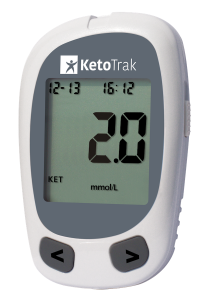KetoTrak®
Blood Ketone
Monitoring System.
The KetoTrak Blood Ketone Monitoring System is designed for accurate,
easy and fast testing of β-ketone concentration from fresh whole
blood sample in 3 easy steps in 10 seconds.
Why Ketotrak?


Accurate Daily Tracking
- Track Blood Ketone levels while on Keto Diet
- More accurate than urine strips
Ease of Use
- Simple 2 button interface
- Small 1.2 µL blood sample
- Results in 10 seconds
Before & After Meal Markers
- Track pre and post meal results
- Measure the effect of different foods on blood ketone levels
About KetoTrak
KetoTrak Blood Ketone Monitoring System from ACON offers you the ability to measure blood ketone levels easily and accurately with a small amount of blood in less than 10 seconds.

Who we are

How we will help you
KETOgenic Diet
What is Ketogenic Diet (KD)?
Ketogenic diet is a low carb, moderate protein, and high fat diet which puts the body into a metabolic state known as ketosis. It dates back to the early 1900s when it was discovered for controlling seizures.
Today, many people choose the keto diet for weight loss, improved neurological functioning, increased mental clarity, and sustained all-day energy.
With the average person’s diet, glucose is the main energy source. When you eat, let’s say a muffin, your body will produce glucose. Glucose is the easiest molecule for your body to convert and use as energy and that is why it’s the preferred energy source for your body.
Again, in an average person, the extra glucose gets converted into fat which is then stored, thanks to release of Insulin. Insulin is a fat storage hormone. With more circulating insulin in your bloodstream, your body converts the carbohydrates to fat and stores them — on your buttocks, thighs, abdomen and hips.
“Sugar-burners” are people who eat a lot of carbohydrates. They burn carbs for energy and need a steady supply of carbs to keep their energy up. Always relying on carbs for energy, they have difficulty accessing and burning their stored fat.
When we eat less carbs, we become “fat-burners.” The body first goes for carbs to burn for fuel, but after it burns the small amount of carbohydrates eaten, primarily from vegetables, it then accesses and burns stored body fat, which leads to weight loss
When you lower your consumption of refined carbohydrates, your blood glucose level and insulin level drops. And the body begins to look for an alternative energy source and your body enters a metabolic state known as ketosis. You can also enter ketosis state by not eating anything for a period of time, fasting.
When in ketosis, your body will start to produce ketones from stored fat to make up for the lack of sugar/carbohydrate energy.
This allows the fat cells to release the water they are storing (it’s why you first see a drop in water weight) and then the fat cells are able to enter the bloodstream and head to the liver.
When your body is producing optimal ketone levels you begin to notice many health, weight loss, physical and mental performance benefits.
Although the ketogenic diet is safe for healthy people, there may be some initial side effects while your body adapts. This is often referred to as the keto flu and is usually over within a few days. Keto flu includes poor energy and mental function, increased hunger, sleep issues, nausea, digestive discomfort and decreased exercise performance.
To minimize this, you can try a regular low-carb diet for the first few weeks. This may teach your body to burn more fat before you completely eliminate carbs.
A ketogenic diet can also change the water and mineral balance of your body, so adding extra salt to your meals or taking mineral supplements can help.
Weight loss:
Probably the number one reason why people switch to KD is for the weight loss. When you lower your consumption of carbohydrates, your body burns fat as fuel which keeps you stable and satiated throughout the day. If you stay within your daily recommended macros (calories broken down into percentages of fat, protein, and carbs), you can also burn excess fat and lose weight fast.
Brain Health:
The brain loves ketones. Outside of epilepsy, a keto diet supports other neurological conditions, such as Alzheimer’s andParkinson’s. Keto also helps with concentration, memory, focus, cognition, and decreased brain fog.
Cancer:
Researchers are studying keto as an adjunctive treatment for cancer. So far, results are promising. In recent research, keto significantly increased survival time and slowed tumor growth. Tumor types were pancreatic, prostate, gastric, colon, brain, neuroblastoma and lung cancers.
Try KetoTrak Today
KetoTrak Blood Ketone Monitoring Systems and Strips are available in different configuration. Optimize your results today.
